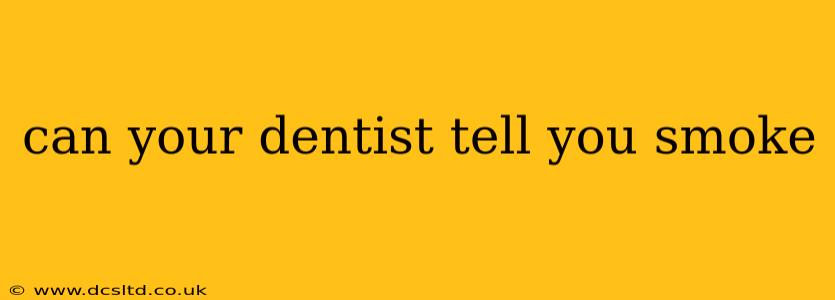Can Your Dentist Tell if You Smoke?
Yes, your dentist can often tell if you smoke, and even gauge how heavily you smoke, through a variety of observable signs and indicators. This isn't about judgment; it's about your oral health. Smoking significantly increases your risk of various oral health problems, and your dentist's observations can help them provide the best possible care and advice.
Here's how your dentist can detect smoking:
1. What are the visible signs of smoking in the mouth?
The most obvious signs are visible changes in your teeth and gums. These include:
-
Stained Teeth: Nicotine and tar in cigarettes stain teeth a yellowish-brown, sometimes even a dark brown or black. The staining is usually more pronounced on the surfaces of the teeth most directly exposed to smoke. The degree of staining can often correlate with the duration and intensity of smoking.
-
Receding Gums: Smoking reduces blood flow to the gums, making them more susceptible to infection and disease. This reduced blood flow can lead to gum recession, exposing more of the tooth root and making the teeth appear longer.
-
Gum Disease (Periodontitis): Smoking significantly increases the risk of gum disease, characterized by inflammation, bleeding gums, and potential tooth loss. Dentists can easily spot signs of gingivitis (early gum disease) and periodontitis during a routine examination.
-
Bad Breath (Halitosis): The lingering smell of smoke on the breath is a strong indicator of smoking. While mouthwash can temporarily mask the odor, the underlying cause will still be detectable.
-
Oral Cancer Lesions: Smoking is a major risk factor for oral cancer. Dentists are trained to identify suspicious lesions or changes in the tissues of the mouth and throat during routine checkups.
2. How can dentists detect smoking beyond visible signs?
Beyond what they can visually observe, dentists can also infer smoking habits from other clues:
-
Medical History: During your dental checkup, you'll be asked about your medical history, including smoking habits. Being honest with your dentist is crucial for receiving the most effective treatment.
-
Assessment of Overall Oral Health: The dentist's overall assessment of your oral health will take into account all the above factors to develop a comprehensive picture. A combination of several indicators strongly suggests smoking.
3. Does it matter if my dentist knows I smoke?
Absolutely! Knowing you smoke allows your dentist to:
-
Provide targeted preventative care: They can recommend specific strategies to mitigate the risks associated with smoking, such as more frequent cleanings or specialized treatments.
-
Offer cessation advice: Many dentists are trained to provide guidance and resources for smoking cessation programs, helping you quit for improved oral and overall health.
-
Identify and treat potential problems early: Early detection of gum disease or precancerous lesions significantly improves the chances of successful treatment.
4. Why is it important to be honest with my dentist about smoking?
Open communication with your dentist is key to maintaining optimal oral health. Withholding information about your smoking habits hinders their ability to provide the best possible care and could lead to more severe problems down the line. Your dentist is there to help you, not to judge you. Their primary concern is your health and well-being.
In conclusion, while your dentist isn't a law enforcement officer, they have the training and experience to detect smoking through a variety of signs and symptoms. This knowledge is crucial for providing appropriate care and promoting your overall oral health. Remember, honesty is the best policy when it comes to your dental health.
